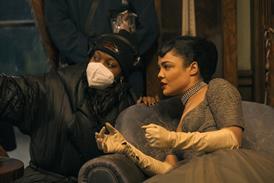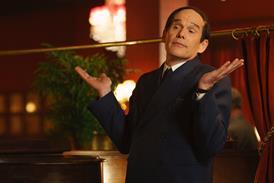Dir: Adam Rapp. US. 2005. 98mins.
A well-written and literate, if not very original,drama, Winter Passing would have themakings of an auspicious debut feature from director-writer Adam Rapp, were itnot for the over-conventional cinema language that it employs.
Rapp shows himself to be astrong writer with his piece about a young New York actress who returns home toface her childhood demons, thereby learning that the truth is more complex andless accommodating than she always believed.
But while the gifted Zooey Deschanel, stronglysupported by the likes of Ed Harris, Will Ferrell and Amelia Warner, ensuresthat Winter Passing is alwaysinteresting to watch, it is never sufficiently compelling to stay in the mindfor long once it is over.
It is likely to enjoy adecent but unexceptional theatrical career when it opens in the US on Feb 17next year, with stronger chances on TV among older audiences, who willappreciate its arguments about children better understanding their parents.
Reese Holden (Deschanel), a highly-strung Off-Broadway actress, has notbeen home to visit her parents, both well-known writers, for more than sixyears - even skipping the recent funeral of her mother.
As the show she is appearingin is about to wrap, Reese is approached by pushy literary agent Lori Lansky (AmyMadigan), who offers her $100,000 if she can get hold of the letters exchangedbetween her parents during their three-year courtship.
While she initially rejectsthe offer, Reese is profoundly disturbed by the encounter. Insecure andvacillating between snorting coke and sleeping with various partners, she facetiouslysuggests to the agent that she fund her trip home to Michigan so that she cansearch for the letters (whether she ever intends to deliver them is anothermatter).
Once home, Reese discoversthat her freshly-widowed father Don (Harris) has moved himself and his workingquarters to the garage, where he now eats, drinks, works and sleeps.
The house itself has beentaken over by two strangers. One is Corbit (Ferrell)a karate-wielding would-be rock musician - who is unable to simultaneously singand play guitar - who functions as a part-time bodyguard, man around the house,plumber, mechanic and mason.
The other is Shelly(Warner), a former student of her father and an ardent admirer of his work, whodoes all the cooking and washing. Astonished and disapproving, Reese has evidentlycome home not only to find the letters but also to settle personal accountswith the parents who always treated her as a mild inconvenience, incidental totheir own careers.
Seeing her father - who hasnot published a work in more than 20 years, resigned his teaching job severalsemesters ago and is now moping around disconsolately, drinking himself to death- unsettles Reese even more.
Denied her usual succour atsuch critical moments (she finds drugs and sex hard to find in these parts), Reeseinevitably confronts first Corbit, then Shelly, andfinally - and most dramatically - her father, before a predictable ending thatconcentrates on the graceful acceptance of one's life and one's lot.
To the credit of Rapp's screenwritingtalents, each part is endowed with enough quirks and singularities to make theminteresting.
He has also cast theappropriate actors to exploit these qualities to the hilt. Deschanelis completely at ease with Reese's vulnerable self-pity, while Harris is almosttypecast to capture the disconsolate despondency of an artist at the end of hiscareer.
Ferrell's gawky, hesitantconduct underlines the contradiction between his personality and the professionhe claims he has chosen for himself, while Warner manages to project, in herown quiet, composed way, a depth that might not be evident at first glance.
The problem, however, isthat drunken authors with writers block are a dime a dozen in Americanliterature - and so are children blaming famous parents for their problems.
On the evidence here Rapp,working from a two-act play of his own, is still keen on theatrical entrances butless than comfortable with the opening up of the stage origins of the sourcematerial.
It may also be the reasonfor the feature's uneven pacing, mostly evidenced through an unnecessarily longintroduction preceding Zooey's return home.
Even more serious is theconventionality of the cinema language employed. The choice of every cameraset-up, every cut and every set, are pleasing but over-obvious, which meansthat the audience are lulled into a sense of knowing what is about to happen -not necessarily an asset.
Production companies
Stratus Films
Focus Features
US distribution
Yari/Freestyle
International sales
Syndicate Films International
Executive producers
Mark Gordon
Bob Yari
Laura Bickford
Producers
P Jennifer Dana
David Koplan
Cinematography
Terry Stacey
Editor
Meg Reticker
Production design
David Korins
Music
John Kimbrough
Main cast
Zooey Deschanel
Ed Harris
Will Ferrell
Amelia Warner
Amy Madigan
Dallas Roberts
Robert Beitzel
Deirdre O'Connell

















No comments yet